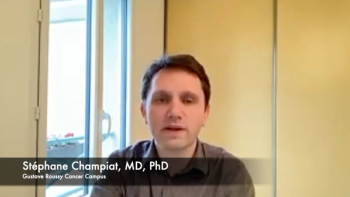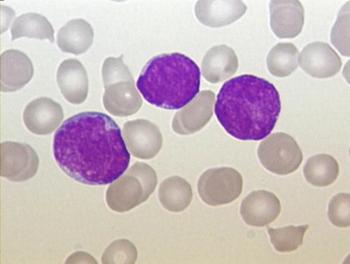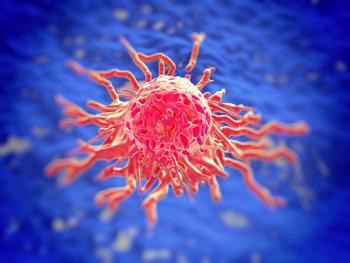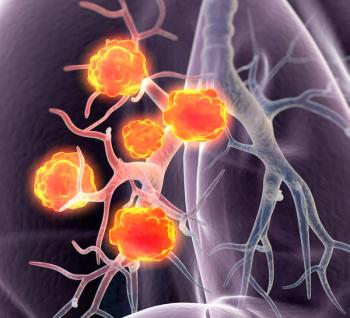
The combination of sotigalimab plus pembrolizumab was associated with a tolerable safety profile in patients with unresectable stage III or IV metastatic melanoma.

Your AI-Trained Oncology Knowledge Connection!


The combination of sotigalimab plus pembrolizumab was associated with a tolerable safety profile in patients with unresectable stage III or IV metastatic melanoma.

Patients with advanced melanoma receiving nivolumab plus ipilimumab in the second-line setting had significant improvement in progression-free survival.

Novel BO-112 when combined with pembrolizumab may offer a new treatment option for patients with advanced melanoma and PD-1 inhibitor therapy resistance.

Stéphane Champiat, MD, PhD, spoke about the results of the AURELIO-03 trial with SOT101 and pembrolizumab for patients with advanced solid tumors.

The safety and efficacy of NG-641 plus nivolumab will be assessed as part of the phase 1a/b NEBULA trial in patients with previously treated metastatic or advanced epithelial tumor.

Investigators uncovered potential mechanisms of resistance to CD19-directed CAR T-cell therapy in patients with pediatric acute lymphoblastic leukemia.

The CoVac-1 vaccine appears to reduce COVID-19 symptoms for patients with cancer who have disease- or treatment-related immunoglobulin deficiency.

Patients with advanced solid tumors experienced an increase in dose-dependent T-cell proliferation following treatment with MEDI5752.

Bone marrow fibrosis improvement and variant allele frequency reduction observed with navitoclax plus ruxolitinib for patients with previously treated myelofibrosis may suggest disease modification.

Ibrutinib plus venetoclax given at a fixed duration yielded favorable progression-free survival in patients with previously untreated, high-risk chronic lymphocytic leukemia and small lymphocytic lymphoma.

Patients with advanced or recurrent uterine serous carcinoma derived promising benefit from treatment with ZN-c3.

Patients with metastatic castration-resistant prostate cancer who had a high genomic loss of heterozygosity may respond better to treatment with talazoparib.

The phase 1b/2 KontRASt-01 trial demonstrated a positive safety profile of JDQ443 for patients with KRAS G12C-mutant solid tumors.

Patients with non–small cell lung cancer harboring a MET exon 14 skipping mutation appeared to derive durable efficacy following treatment with SCC244.

Adjuvant durvalumab combined with different monoclonal antibodies led to enriched major pathologic responses in early-stage non–small cell lung cancer.

Patients with solid malignancies may benefit from treatment with next-generation PARP inhibitor AZD5305, according to findings from the phase 1/2a PETRA study.

Between 2004 to 2016, investigators reported that mammography rates decreased among breast cancer survivors.

Results of a phase 3 trial comparing neoadjuvant nivolumab plus chemotherapy denoted benefit vs chemotherapy alone for patients with resectable non-small cell lung cancer.

Antitumor activity was noted for patients with recurrent or metastatic head and neck cancer who were treated with pepinemab plus pembrolizumab.

Patients with resectable gastric and gastroesophageal junction adenocarcinoma experienced good pathologic complete response with standard of care chemotherapy and perioperative/adjuvant pembrolizumab.

Those with inflamed T cell or YAP1–positive extensive-stage small cell lung cancer were likely to gain an improvement in overall survival following treatment with durvalumab and chemotherapy vs those with other overexpressed biomarkers.

Genetic determinants of PSA proved to robustly predict prostate cancer diagnoses and improve the detection of aggressive disease; however, larger and more diverse studies are still required.

Results of CheckMate 649 trial show consistently improved outcomes across advanced gastric cancer, gastroesophageal junction cancer, and esophageal adenocarcinoma when nivolumab is administered in combination with chemotherapy.

The CAR T-cell product BNT211 when used with or without a CAR T cell–amplifying RNA vaccine produced considerable responses and safety in patients with CLDN6-positive advanced solid tumors.

Acceptable efficacy and safety were elicited in patients with advanced solid tumors and high tumor mutational burden detectable in both blood and tissue samples with nivolumab/ipilimumab therapy.

Patients with advanced or metastatic endometrial cancer experienced a significant non-progression rate following treatment with olaparib, metronomic cyclophosphamide, and metformin.

A significant proportion of patients with nonclonal ductal carcinoma in situ were found to have recurrence that was not genetically linked to the primary tumor.

Children and young adults with H3K27M-positive diffuse intrinsic pontine gliomas and spinal diffuse midline gliomas saw a clinical benefit when treated with GD2-directed chimeric antigen receptor T cell therapy.

Updated data from the phase 1/2 CodeBreaK 100 trial of sotorasib provide the longest follow-up of a KRAS G12C inhibitor in non–small cell lung cancer.

The European Commission approved lisocabtagene maraleucel for the treatment of certain patients with relapsed/refractory large B-cell lymphoma.